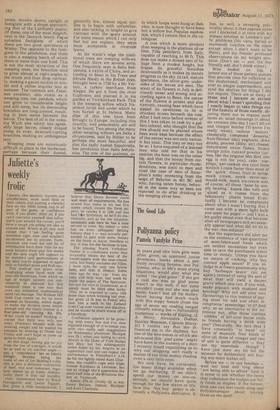'The Good Life
Pollyanna policy
Pamela Vandyke Price
In years past nice little girls were often given, as approved junior diversions, books about a perfectly revolting heroine, one Pollyanna., who, in life's more trying situations, would play what she called "the glad game." If she got a cold she was so glad pussy wasn't in the well, if her sums wouldn't come out she was glad daddy hadn't lost all his money. Never having had much truck with this soppy female (from the age of seven my reading ranged robustly among the — fortunately numerous — works of Kipling, G. A. Henty, Alexandra Dumas, Stanley Weyman, Captain Marryat) 1 cannot say that she influenced me in the slightest, but one of the wee tomes in which she advocated this 'glad game ' might have been in the nursery of a man I recently heard expatiating as to why our shopping isn't really a matter of too little money chasing even a very little nosh.
We now have, he contended, too many things available when we go marketing. If we didn't spend our money on non-essentials, we should have quite enough for the few staves of life. Now this • Not buy' policy is obviously a Pollyanna derivative. It
has, as well, a sweeping practicality about it that appeals to roe and I docketed it at once with my instant solution to London's traffic problems (No vans, lorries or mammoth coaches on the roads except when 1 don't want to be there), and my friends' profound observations on my weight situation (Don't eat — and, the less friendly add, don't drink either).
Wire basket on hip, I joined one of those patient queues that provide time for reflection in the modernised, mechanised and ever so adagio supermarkets, and eyed the shelves for things I did not require. There are so many of these and I became so excited about what I wasn't spending that I nearly began to take things out of the baskets of those nearby, abjuring them not to require such items as: salad dressings in about six versions (the day I can't lift oil and vinegar bottles I'll know I'm really weak), various 'instant chemically composed 'desserts,' fruit-flavour (sic) yoghurts, ditto drinks, process (ditto, sic) cheese, dehydrated onion flakes, frozen orange juice, custard powder (unless, like the original Mrs Bird, the egg is not for you), cake 'toppings,' par-cooked rice (rice from scratch I cook faster than most of the ' quick ' rices), fruit in syrup, mock cream, mock never-saymould-milk, mock ice-cream. and, of course, all those 'bake by simply heating' kapok-like rolls and ' sliced as it comes from the laboratory ' plastic bread. Eventually I became so complacent about what I wasn't buying that I came out with a mere light bulb and some loo paper — and I was a bit guilty about even that because after all newspapers still occasionally appear and what did we do in the War, mes enfants?
But the experience did alert me to the existence of vast quantities of semi-fabricated foods which are neither necessities nor even able to save the purchasers either time or money. Unless you have no means of cooking, why buy canned apple sauce? If you indulge in al fresco gastronomy why buy ' barbeque sauce • (sic yet again), instead of using the sort of meat that will yield a decent gravy which you can, if you wish, make piquant with mustard and ketchup? Why not add your own flavourings to rice instead of paying more for odd and often incongruous ' seasonings ' in it? And why, as an alternative to the nutritious nut, offer those curious ' nibbles of left-over bacon rinds to friends having a drink with you? (Naturally, the fact that I have constantly 'to hand ' six sorts of mustard, four kinds of olive oil, three of vinegar and two of salt is quite different — they are my essentials. . . though I have just done my, bit for the squeeze by deliberately not buying any more Italian oil).
Before we — or our families — wail too loud and long about ' not being able to afford' food, it is sense to ask whether the items that unbalance the budget are frilly foods or staples. If the former, then one can feel cosily snug and Pollyannaesque about leaving them on the shelf.


































 Previous page
Previous page